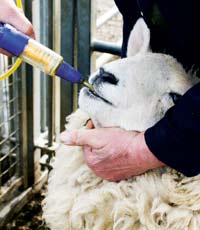Groundbreaking roundworm vaccine

A breakthrough in roundworm control could see worm burdens lowered by up to 90%, according to researchers at Moredun Research Institute, Edinburgh.
Recent trials at the Institute found it was possible to successfully immunise sheep against the roundworm Haemonchus contortus, a blood sucking worm most common in the tropics and sub-tropics.
“Although this worm is commonplace in warm, humid environments, thanks to climate change, it has also recently been described as an emerging UK disease by the Vet Lab Agency,” explained researcher, David Smith.
The barber pole worm, as it is otherwise known, causes huge problems in sheep, cows and goats with many drug resistant strains of Haemonchus commonplace in countries like Australia.
“The resistance to drugs is a serious problem and in Australia it is the bane of many sheep graziers.”
The highly effective vaccine developed at Moredun won’t kill 100% of the parasite but it will reduce the worm burden by 80-90%, said Dr Smith.
“The vaccine works by killing the worm and preventing development of eggs. When Haemonchus ingests antibodies produced by vaccinated sheep the antibodies bind to the surface of the worms gut wall, which impairs the ingestion of the worm’s blood meal. As an end result this leads to worm starvation, reduced faecal egg output and ultimately less worms.”
Crucially, the most recent experiment found the dose of vaccine needed to reduce worm burdens was low. “This breakthrough means it should be possible to make the vaccine commercially, simply by extracting it from adult worms.
“Deliberately infecting 200 donor sheep with worms will give 2kg worms, which equates to 1m doses of vaccine.”
The vaccine is currently being tested on 100 grazing lambs in Australia and when successful, plans are in place to start making it commercially in Australia. “Early indications also suggest the same vaccine could be used for cattle in the tropics which are commonly infected with a related roundworm, Haemonchus placei,” said Dr Smith.
But, developments don’t stop there, he explains. “When we can make a vaccine for sheep and cattle worms the technology could move on rapidly to try and develop a vaccine for human worms.”
Incorrect use of wormers in cattle means resistance to a wide range of drugs is becoming increasingly common, according to Moredun’s Jacqui Matthews.
“Compared to sheep, wormer resistance in roundworms of cattle and horses has received far less attention and it is emerging multi drug resistance occurs in these species too,” she said.
“The problem is, people are overusing wormers, treating too frequently, using the same wormer for the same period and sometimes not even using the right wormer. In horses we predict 80-90% to be infected with a specific roundworm cyathostomin, not because they aren’t being treated, but because of drug resistance.”
Work is currently being conducted at Moredun to establish how widespread resistance is in the important roundworms of cattle.
“It’s important we find out whether a lack of efficacy to a product is because of drug resistance or whether the product isn’t working properly because it is being washed off before it has chance to absorb in to the skin,” said Prof Matthews.
